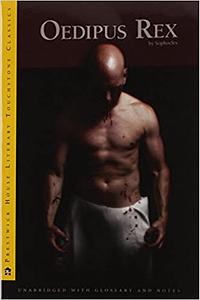Take a photo of a barcode or cover
dark
emotional
mysterious
reflective
sad
tense
fast-paced
Plot or Character Driven:
A mix
Strong character development:
Yes
Loveable characters:
Complicated
Diverse cast of characters:
No
Flaws of characters a main focus:
Yes
I read this book for school, and enjoyed it a lot more than I thought i would, I actually felt pretty confident on my essay about it too! I’d add that here but it was written…
Très bien, même si c'est difficile d'y voir un roman noir, quand on connaît les grandes lignes du mythe, ça reste, hé bien, un mythe. Mais c'est très intéressant de lire cette retranscription, dans un style moderne, avec une narration plus souple, dirais-je, que les auteurs classiques (même si je n'ai pas lu le Sophocle, j'imagine que c'est tout de même moins simple de s'y pencher).
mysterious
tense
fast-paced
Plot or Character Driven:
Character
Strong character development:
Yes
Loveable characters:
Complicated
Diverse cast of characters:
N/A
Flaws of characters a main focus:
Yes
dark
slow-paced
Plot or Character Driven:
Plot
Strong character development:
Yes
Loveable characters:
No
Diverse cast of characters:
No
Flaws of characters a main focus:
Yes
adventurous
challenging
dark
emotional
mysterious
reflective
sad
tense
medium-paced
Plot or Character Driven:
Character
Strong character development:
Yes
Loveable characters:
No
Diverse cast of characters:
No
Flaws of characters a main focus:
Yes
Free will does not exist.
At least, according to Sophocles it doesn't. Take Oedipus Rex as a perfect example, he hears an oracle predicting his future, a future so horrible that he cannot bear the thought of it. So he packs his bags and leaves his father and mother for fear of killing one and sleeping with the other. However, his fate follows him and he ends up doing exactly as predicted.
The real kicker here is that it's almost as if the gods are playing a joke on Oedipus. First they tell his birth parents that he is fated to kill one of them and then they tell his adoptive parents the same, forcing Oedipus to flee and, in turn, fulfill the prophecy on the way to Thebes. I'm sure the gods knew that this would be how Oedipus would fulfill his fate. He never stood a chance. He never had a choice.
There are a lot of different interpretations for Oedipus Rex, but I think an important aspect lies within these lines:
Pride is the germ of kings;
Pride, when puffed up, vainly, with many things
Unseasonable, unfitting, mounts the wall,
Only to hurry to that fatal fall,
Where feet are vain to serve her. But the task
Propitious to the city GOD I ask
Never to take away!
GOD I will never cease to hold my stay.
Fate has to be achieved somehow, so how, exactly, did Oedipus go about achieving his? It was Oedipus's own pride that kept him from truly heeding the oracle. Yes, he believed it at first and fled from Corinth in fear, but when it was presented to him in the most plain of terms, he could not accept it. Even when it was obvious, without a shadow of a doubt, that he had been sleeping with his mother and killed his own father, he could not believe it until he had been told by one who had witnessed his fate. His pride led to his fall, much as it does for most legends and myths.
Towards the end of the play, Creon says this:
Even you might trust what the God answers, now.
This line further cements my idea that it was pride that led to Oedipus fulfilling his own destiny. Also, I think that this is a hint to Oedipus that it was his own disregard for the gods that brought this upon himself. He was cursed from birth and yet still lived as a king.
The message is simple here: people should not be so conceited to believe that they can create their own fates. Your life is set in stone and there is nothing you can do to prevent what is supposed to happen from happening.
At least, according to Sophocles.
At least, according to Sophocles it doesn't. Take Oedipus Rex as a perfect example, he hears an oracle predicting his future, a future so horrible that he cannot bear the thought of it. So he packs his bags and leaves his father and mother for fear of killing one and sleeping with the other. However, his fate follows him and he ends up doing exactly as predicted.
The real kicker here is that it's almost as if the gods are playing a joke on Oedipus. First they tell his birth parents that he is fated to kill one of them and then they tell his adoptive parents the same, forcing Oedipus to flee and, in turn, fulfill the prophecy on the way to Thebes. I'm sure the gods knew that this would be how Oedipus would fulfill his fate. He never stood a chance. He never had a choice.
There are a lot of different interpretations for Oedipus Rex, but I think an important aspect lies within these lines:
Pride is the germ of kings;
Pride, when puffed up, vainly, with many things
Unseasonable, unfitting, mounts the wall,
Only to hurry to that fatal fall,
Where feet are vain to serve her. But the task
Propitious to the city GOD I ask
Never to take away!
GOD I will never cease to hold my stay.
Fate has to be achieved somehow, so how, exactly, did Oedipus go about achieving his? It was Oedipus's own pride that kept him from truly heeding the oracle. Yes, he believed it at first and fled from Corinth in fear, but when it was presented to him in the most plain of terms, he could not accept it. Even when it was obvious, without a shadow of a doubt, that he had been sleeping with his mother and killed his own father, he could not believe it until he had been told by one who had witnessed his fate. His pride led to his fall, much as it does for most legends and myths.
Towards the end of the play, Creon says this:
Even you might trust what the God answers, now.
This line further cements my idea that it was pride that led to Oedipus fulfilling his own destiny. Also, I think that this is a hint to Oedipus that it was his own disregard for the gods that brought this upon himself. He was cursed from birth and yet still lived as a king.
The message is simple here: people should not be so conceited to believe that they can create their own fates. Your life is set in stone and there is nothing you can do to prevent what is supposed to happen from happening.
At least, according to Sophocles.
The popularity and memorability of this play goes without saying. Sophocles is a master of his craft and the way he utilizes dramatic irony to construct one of the first detective stories in recorded literature (along with one of the most shocking endings) is memorable.
Its classification as a tragedy is interesting, as I'm not sure I really see any fatal flaws in Oedipus (I'm familiar with arguments that allege it's due to his pride, curiosity, ingenuity, etc. I just don't completely buy them). As a result, the play lacks the strong thematic ending that, say, Antigone has in my book. That being said, while I wouldn't rate Oedipus Rex at the top of the "Theban Trilogy," there's a reason we've been talking about this play and its themes for the last several millennia.
UPDATE 1-20: After reading through the work for the third time, I'm slowly coalescing around the theory that Oedipus' "fatal flaw" is his normal human belief that he has control over his life and can obtain his goals with enough ingenuity and hard work. It's not that he's more prideful than anyone else--it's that normal human desire and beliefs go against the Greek idea of fate. Oedipus Rex is therefore a play warning its audience the dangers of trying to seek control over their own lives and a reminder of the gods' superiority over normal humankind.
It may take another read-through or some more commentary reading to fully decide if this theory holds up. But between a better glimpse toward what the play is trying to imply along with truly appreciating the rich character conflicts and characterizations, I'm bumping this up to a 5-star review. It may be short, but it packs a punch.
Rating: 4.5 Stars (Excellent).
Its classification as a tragedy is interesting, as I'm not sure I really see any fatal flaws in Oedipus (I'm familiar with arguments that allege it's due to his pride, curiosity, ingenuity, etc. I just don't completely buy them). As a result, the play lacks the strong thematic ending that, say, Antigone has in my book. That being said, while I wouldn't rate Oedipus Rex at the top of the "Theban Trilogy," there's a reason we've been talking about this play and its themes for the last several millennia.
UPDATE 1-20: After reading through the work for the third time, I'm slowly coalescing around the theory that Oedipus' "fatal flaw" is his normal human belief that he has control over his life and can obtain his goals with enough ingenuity and hard work. It's not that he's more prideful than anyone else--it's that normal human desire and beliefs go against the Greek idea of fate. Oedipus Rex is therefore a play warning its audience the dangers of trying to seek control over their own lives and a reminder of the gods' superiority over normal humankind.
It may take another read-through or some more commentary reading to fully decide if this theory holds up. But between a better glimpse toward what the play is trying to imply along with truly appreciating the rich character conflicts and characterizations, I'm bumping this up to a 5-star review. It may be short, but it packs a punch.
Rating: 4.5 Stars (Excellent).
challenging
slow-paced
Plot or Character Driven:
Character
Flaws of characters a main focus:
Yes
dark
mysterious
tense
fast-paced
Plot or Character Driven:
Character
Strong character development:
Yes
Loveable characters:
No
Diverse cast of characters:
N/A
Flaws of characters a main focus:
Yes






